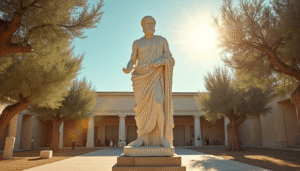
Plotinus (204-270 CE), the founder of Neoplatonism, stands as one of philosophy’s most profound mystic thinkers. His revolutionary approach to understanding reality, consciousness, and the divine has influenced Western thought for centuries. Through his systematic exploration of the One, the Intellect, and the Soul, Plotinus created a philosophical framework that bridged ancient Greek philosophy with mystical experience. His teachings on the ascent of the soul toward union with the One continue to inspire seekers of wisdom today. The Plotinus quotes collected here reveal a mind dedicated to understanding the deepest mysteries of existence, offering timeless insights into the nature of reality, beauty, and spiritual transformation. These powerful words illuminate pathways to inner knowledge and divine connection.
Plotinus Best Quotes
- “The soul that beholds beauty becomes beautiful.” – Enneads I.6.9
- “We must not run after the One, but prepare ourselves for the vision and then wait tranquilly for its appearance.” – Enneads V.5.8
- “The mind in making contact with what is always real must be real itself.” – Enneads V.9.5
- “Beauty is rather a light that plays over the symmetry of things than the symmetry itself.” – Enneads I.6.3
- “The source of evil is the Soul’s weakness in the face of its desires.” – Enneads I.8.4
- “We are not separated from spirit, we are in it.” – Enneads VI.9.8
- “The One is not absent from anything and yet is separate from all things.” – Enneads VI.9.4
- “Knowledge has three degrees: opinion, science, and illumination.” – Enneads VI.9.4
- “Often I have realized my essential self; I have withdrawn into myself.” – Enneads IV.8.1
- “The good soul is the soul that loves the good and seeks to become like it.” – Enneads I.6.6
- “Withdraw into yourself and look.” – Enneads I.6.9
- “The stars are letters which inscribe themselves at every moment in the sky.” – Enneads II.3.7
- “Time is the life of the soul in movement as it passes from one stage of act or experience to another.” – Enneads III.7.11
- “The soul becomes prudent and just and brave.” – Enneads I.2.1
- “What we love we grow to resemble.” – Enneads I.6.8
The Plotinus famous quotes above reveal his best philosophy centered on the soul’s journey toward divine union. His outlook emphasizes that reality consists of emanations from the One, with beauty serving as a guide for spiritual ascension. This neoplatonic philosophy presents existence as a hierarchy where the material world reflects higher spiritual realities, encouraging seekers to transcend physical limitations through contemplation and inner purification.
Famous Plotinus Aphorisms
- “Cut away everything.” – Enneads V.3.17
- “The One is all things and no one of them.” – Enneads V.2.1
- “Like seeks like.” – Enneads IV.9.3
- “The flight of the alone to the Alone.” – Enneads VI.9.11
- “Be like the center of a circle.” – Enneads VI.8.18
- “The soul is amphibious.” – Enneads IV.8.4
- “We see light by light itself.” – Enneads V.3.8
- “The One is beyond being.” – Enneads VI.9.3
- “Simplicity is divine.” – Enneads VI.9.6
- “The soul sleeps here, but yonder is awake.” – Enneads IV.8.1
- “Become what you contemplate.” – Enneads V.8.11
- “The soul is never without God.” – Enneads V.1.2
- “Unity produces multiplicity.” – Enneads V.4.1
- “All things aspire to contemplation.” – Enneads III.8.1
- “The eye cannot see the sun unless it becomes sun-like.” – Enneads I.6.9
These Plotinus aphorisms and Plotinus sayings express his condensed wisdom about spiritual transformation. His outlook emphasizes radical simplification and the soul’s innate capacity for divine union. These brief statements encapsulate his philosophy that consciousness can transcend individual limitations through contemplative practice, ultimately achieving mystical unity with the source of all existence while maintaining the paradox of remaining distinct yet united.
Affirmations Inspired by Plotinus
Plotinus himself did not write formal affirmations, but his philosophical insights inspire powerful affirmative statements for spiritual practice:
- I am connected to the divine source of all existence
- Beauty flows through me and transforms my soul
- I withdraw into my essential self with confidence
- My soul naturally seeks union with the One
- I contemplate truth and become truthful
- Light illuminates my consciousness from within
- I transcend material limitations through inner vision
- My soul is eternally connected to divine wisdom
- I cut away all that is not essential to my being
- Divine beauty manifests through my contemplation
- I am both individual and universal simultaneously
- My consciousness expands beyond physical boundaries
- I seek the One and prepare for divine vision
- Spiritual light guides my understanding
- I embody the good through loving contemplation
- My soul awakens to its divine nature
- I practice the flight of the alone to the Alone
- Divine simplicity flows through my being
- I align with the eternal through present-moment awareness
- My soul becomes what it contemplates most deeply
- I am never separated from spiritual reality
- Inner light reveals truth beyond appearances
- I cultivate virtue through philosophical contemplation
- Divine emanation flows through all my experiences
- My consciousness participates in eternal being
- I embrace the paradox of unity and multiplicity
- Spiritual vision emerges through inner purification
- I seek beauty as a pathway to transcendence
- My soul remembers its divine origin
- I practice intellectual and mystical contemplation
- Divine presence illuminates my daily experience
- I cultivate detachment from material desires
- My consciousness ascends through levels of reality
- I embody wisdom through philosophical practice
- Divine love transforms my understanding
- I seek union while maintaining individual awareness
- Spiritual insights emerge through contemplative discipline
- I align my will with divine purpose
- My soul participates in eternal contemplation
- I embrace the mystery of divine transcendence
- Inner vision reveals the unity underlying diversity
- I practice the ascent of consciousness systematically
- Divine wisdom flows through my philosophical inquiry
- I cultivate the virtues through spiritual practice
- My consciousness reflects divine intelligence
- I seek the One beyond all categories and concepts
- Spiritual beauty attracts my soul toward truth
- I practice turning inward to discover my essence
- Divine emanation creates and sustains my being
- I embody the philosophical life through daily practice
These Plotinus affirmations and Plotinus inspired affirmations can be used daily for spiritual development. Practice them during meditation, contemplation, or moments of inner reflection. Plotinus teaches that consciousness naturally seeks its source, and affirmations help align awareness with this fundamental spiritual movement. Regular use of these statements can cultivate the contemplative mindset essential to neoplatonic philosophy, supporting the soul’s natural journey toward divine union and wisdom.
Main Ideas and Achievements of Plotinus
Plotinus philosophy represents one of the most sophisticated attempts in ancient philosophy to reconcile rational thought with mystical experience. Born in Lycopolis, Egypt, around 204 CE, Plotinus developed a comprehensive philosophical system that would profoundly influence Christian, Islamic, and Jewish thought for centuries. His Plotinus ideas synthesized Platonic philosophy with his own mystical insights, creating what later scholars would term Neoplatonism.
The foundation of Plotinus works rests on his revolutionary concept of the three fundamental principles: the One, the Intellect (Nous), and the Soul (Psyche). This triadic structure represents a hierarchy of reality where each level emanates from the one above it. The One, also called the Good, stands as the absolute principle beyond all categories, including being and non-being. As scholar Pierre Hadot observes, “For Plotinus, the One is not a being among others, but the source of all being, itself beyond being.”
The concept of emanation distinguishes Plotinus from earlier Platonic thought. Rather than creation ex nihilo, Plotinus describes reality as flowing from the One like light from the sun or heat from fire. This emanation occurs necessarily and eternally, without diminishing the source. The Intellect emanates from the One as the first level of multiplicity, containing all Forms or Ideas in a state of eternal contemplation. From the Intellect emanates the Soul, which serves as the principle animating the material world.
Contemporary scholar John Dillon emphasizes that “Plotinus’s great achievement was to provide a coherent metaphysical framework that could accommodate both the transcendence of the ultimate principle and its immanence in the world.” This framework addresses the central problem of how an absolutely transcendent God can be related to the material world without compromising divine perfection.
The Plotinus books, compiled as the Enneads by his student Porphyry, contain fifty-four treatises organized into six groups of nine. These works demonstrate Plotinus’s systematic approach to philosophy, covering topics from ethics and aesthetics to metaphysics and mysticism. Unlike purely academic philosophy, Plotinus’s writings emerge from lived experience and contemplative practice.
Plotinus’s treatment of the soul represents another major achievement. He distinguishes between the individual soul and the universal Soul, arguing that individual souls are simultaneously distinct from and united with the universal principle. This paradox allows for personal identity while maintaining fundamental unity. As scholar Arthur Hilary Armstrong notes, “Plotinus solves the problem of the one and the many not through logical analysis but through mystical insight combined with rigorous philosophical argumentation.”
The concept of beauty plays a central role in Plotinus philosophy. Unlike earlier theories that located beauty in proportion or harmony, Plotinus argues that beauty emanates from the One and serves as a pathway to transcendence. Beautiful objects participate in divine beauty and can awaken the soul’s memory of its spiritual origin. This aesthetic theory profoundly influenced Renaissance art and Romantic poetry.
Plotinus’s approach to evil represents a sophisticated development of Platonic thought. Rather than attributing evil to a positive principle, he argues that evil consists in the soul’s turning away from its source toward material existence. Evil emerges not from the One’s creation but from the soul’s misdirected attention and desire. This theodicy would later influence Christian theology through thinkers like Augustine.
The practical dimension of Plotinus’s philosophy centers on the soul’s return to its source. This process involves three stages: purification through virtue, contemplation of eternal truths, and mystical union with the One. Unlike purely intellectual philosophy, this approach requires moral development and contemplative practice. Scholar Lloyd Gerson observes that “Plotinus presents philosophy as a way of life aimed at the transformation of the philosopher.”
Plotinus’s influence on subsequent thought cannot be overstated. Christian theologians like Augustine, Pseudo-Dionysius, and later medieval mystics drew heavily on his concepts. Islamic philosophers including Al-Farabi and Avicenna adapted his emanation theory. Jewish thinkers like Ibn Gabirol incorporated his ideas into medieval philosophy. Even modern philosophers like Hegel and Bergson show his influence.
The historical context of Plotinus’s work reveals its significance. Writing during the crisis of the third century, when the Roman Empire faced political and spiritual upheaval, Plotinus offered a vision of transcendent meaning and spiritual transformation. His philosophy provided intellectual respectability to mystical experience while maintaining rigorous logical standards.
Modern scholarship has revealed the originality of Plotinus’s synthesis. While drawing on Plato, Aristotle, and the Stoics, he created a unique philosophical vision. Recent studies by scholars like Kevin Corrigan and John Turner have illuminated his sophisticated understanding of consciousness and self-knowledge.
For readers beginning study of Plotinus books, scholars recommend starting with the treatise “On Beauty” (Ennead I.6), which introduces key concepts accessibly. “The Three Principal Hypostases” (Ennead V.1) provides systematic exposition of his metaphysics, while “On the Good or the One” (Ennead VI.9) represents his most profound mystical insights.
The enduring relevance of Plotinus philosophy lies in its integration of rational thought with spiritual experience. In an age seeking meaning beyond materialism, his vision of reality as fundamentally spiritual and consciousness as capable of transcendence offers profound insights. His influence on Western spirituality, Eastern-Western philosophical dialogue, and contemporary studies of consciousness demonstrates the lasting significance of his achievement in bridging the gap between philosophical rigor and mystical insight.
Magnum Opus of Plotinus
What is Plotinus known for above all is his masterwork, the Enneads, a collection of fifty-four treatises that represent one of philosophy’s most profound explorations of reality, consciousness, and divine transcendence. This work establishes Plotinus as the founder of Neoplatonism and demonstrates why he is considered among the greatest mystical philosophers in Western tradition. The Plotinus best works within the Enneads reveal a systematic yet deeply experiential approach to understanding existence itself.
The Enneads was compiled and edited by Plotinus’s student Porphyry around 301 CE, approximately thirty years after the master’s death. Porphyry organized the treatises into six groups of nine (hence “Enneads,” from the Greek word for nine), though this arrangement reflects thematic rather than chronological order. The work represents twenty-five years of Plotinus’s mature philosophical development, from approximately 244 to 269 CE.
Scholar Pierre Hadot emphasizes that “the Enneads is not merely a philosophical treatise but a spiritual exercise designed to transform the reader’s consciousness.” Unlike purely academic philosophy, these writings emerge from Plotinus’s own mystical experiences and contemplative practice. He reportedly achieved mystical union with the One four times during Porphyry’s six-year discipleship, experiences that inform every page of his philosophical exposition.
The central architecture of the Enneads rests on Plotinus’s revolutionary three-fold structure of reality. The One stands as the absolute principle beyond being and non-being, ineffable and perfect in its unity. From the One emanates the Intellect (Nous), containing all Forms in eternal contemplation. From the Intellect emanates the Soul (Psyche), which animates and governs the material world. This emanation occurs necessarily and eternally, like light from the sun, without diminishing the source.
Contemporary scholar John Dillon observes that “Plotinus’s genius lies in his ability to describe the indescribable through rigorous philosophical argument combined with poetic insight.” The Enneads demonstrates this unique approach throughout, employing careful logical analysis to point toward realities beyond conceptual understanding. This methodology influences both rational philosophers and mystical theologians for centuries.
The treatise “On Beauty” (Ennead I.6) exemplifies Plotinus’s integration of aesthetic experience with metaphysical insight. Here he argues that beauty is not merely proportion or harmony but participation in divine splendor emanating from the One. When the soul encounters beauty, it recognizes its own divine nature and feels drawn toward its spiritual source.
“The soul that beholds beauty becomes beautiful. For approaching and gazing upon this beauty, the soul will have no resource but to love it, and in loving it, to long for union with it.” – Enneads I.6.9
This passage reveals Plotinus’s understanding that aesthetic experience serves as a pathway to spiritual transformation. Beauty awakens the soul’s memory of its divine origin and initiates the journey of return to the One. The contemplation of beauty begins the soul’s ascent through increasingly subtle levels of reality.
“Beauty is rather a light that plays over the symmetry of things than the symmetry itself.” – Enneads I.6.3
Here Plotinus distinguishes his theory from conventional aesthetic theories. True beauty transcends physical proportion, representing divine light manifesting through material forms. This insight profoundly influences Renaissance art theory and Romantic poetry, establishing beauty as a revelation of transcendent reality rather than merely pleasing appearance.
The treatise “The Three Principal Hypostases” (Ennead V.1) provides systematic exposition of Plotinus’s metaphysical framework. This work demonstrates his sophisticated understanding of the relationship between unity and multiplicity, transcendence and immanence.
“The One is all things and no one of them; the source of all things is not all things; all things are its possession running back, so to speak, to it.” – Enneads V.1.1
This paradoxical formulation captures the essential mystery of emanation. The One contains all possibilities without being limited by any particular manifestation. Everything exists through participation in the One while the One remains beyond all categories and determinations.
The culminating treatise “On the Good or the One” (Ennead VI.9) represents Plotinus’s most profound mystical insights. Here he attempts to describe the indescribable absolute principle that transcends being itself.
“We must not run after it, but prepare ourselves for the vision and then wait tranquilly for its appearance, as the eye waits for the sunrise.” – Enneads VI.9.4
This passage reveals Plotinus’s understanding that mystical union cannot be achieved through effort alone but requires receptive preparation and patient openness. The soul must cultivate the proper conditions for divine revelation rather than attempting to grasp the infinite through finite means.
“Often I have realized my essential self; I have withdrawn into myself, leaving aside my body and becoming as it were a center without a circumference.” – Enneads VI.9.1
Here Plotinus describes his own mystical experiences with remarkable precision. The withdrawal into essential selfhood reveals consciousness as fundamentally unlimited and divine in nature. This experiential knowledge forms the foundation for his entire philosophical system.
Arthur Hilary Armstrong, perhaps the most distinguished modern translator of the Enneads, observes that “Plotinus achieves something unique in philosophical literature: the perfect integration of mystical experience with rigorous rational analysis.” The work demonstrates that the highest philosophical insights emerge not from pure reasoning but from the marriage of contemplative practice with intellectual precision.
The influence of the Enneads on subsequent thought proves immeasurable. Christian theologians from Augustine to Aquinas draw heavily on Plotinian concepts. Islamic philosophers like Al-Farabi and Avicenna adapt his emanation theory. Jewish mystical traditions incorporate his understanding of divine transcendence. Even secular philosophers like Hegel and Bergson show clear Plotinian influence.
Modern scholars increasingly recognize the sophistication of Plotinus’s psychological insights. His analysis of consciousness, self-knowledge, and the relationship between individual and universal awareness anticipates contemporary discussions in philosophy of mind. Lloyd Gerson notes that “Plotinus provides resources for understanding consciousness that remain largely unexplored by contemporary philosophy.”
The enduring significance of the Enneads lies in its demonstration that the deepest philosophical insights emerge from lived spiritual experience combined with rigorous intellectual inquiry. In an age often marked by the separation of reason and spirituality, Plotinus’s masterwork offers a vision of their essential unity and mutual enrichment.
Interesting Facts About Plotinus
Several fascinating facts about Plotinus reveal both the man behind the philosophy and the extraordinary nature of his achievement. These details illuminate his character, methods, and the remarkable circumstances surrounding his philosophical development, while also addressing common misconceptions about this profound thinker.
One of the most striking facts about Plotinus concerns his attitude toward his physical existence. According to his student and biographer Porphyry, Plotinus seemed ashamed to be in a body and refused to discuss his origins, parentage, or birthplace in detail. He never celebrated his birthday and declined to sit for portraits or sculptures, reportedly saying, “Is it not enough to have to endure the image in which nature has encased us, that you also want me to consent to leave behind a longer-lasting image of this image?” This attitude reflects his philosophical conviction that the soul’s true nature transcends material embodiment.
A remarkable fun fact about Plotinus’s teaching method reveals his extraordinary intellectual capacity. He never wrote notes or drafts but composed his treatises entirely in his mind before dictating them in finished form. Porphyry reports that when Plotinus sat down to write, it was as if he were copying from a book already written in his consciousness. He wrote continuously without pausing, maintaining intense concentration that left him seemingly unaware of his physical surroundings. This unusual practice suggests an extraordinary level of mental discipline and inner vision.
The famous line often associated with Plotinus—”the flight of the alone to the Alone”—actually represents a mistranslation that has become conventional. The original Greek “phygē monou pros monon” more accurately translates as “the escape of the one to the One,” referring to the individual soul’s return to its divine source. However, the traditional translation has become so deeply embedded in philosophical discourse that most scholars continue using it while noting the linguistic inaccuracy.
Plotinus demonstrated remarkable intellectual independence from traditional philosophical schools. Despite studying with the renowned Ammonius Saccas in Alexandria, he developed a highly original synthesis that went far beyond his teacher’s influence. Modern scholar Kevin Corrigan emphasizes that “Plotinus creates something genuinely new while remaining faithful to the spirit of Platonic philosophy.” This achievement becomes more remarkable considering the generally derivative nature of philosophy during the later Roman Empire.
A persistent misconception about Plotinus involves his supposed rejection of the material world. While he certainly privileged spiritual over material reality, careful reading reveals a more nuanced position. He viewed the material world as a necessary and beautiful manifestation of divine creativity rather than something to be despised. Scholar John Dillon notes that “Plotinus’s philosophy is world-affirming in its recognition of divine presence throughout creation, even while advocating transcendence of material attachment.”
The circumstances of Plotinus’s mystical experiences deserve special attention. Porphyry reports that during his six years of study with the master, Plotinus achieved mystical union with the One four times. These experiences were not mere emotional states but profound philosophical insights that informed his entire systematic philosophy. Unlike many mystics who struggle to articulate their experiences, Plotinus successfully translated mystical insight into rigorous philosophical discourse.
Plotinus’s influence on early Christianity proves more complex than often assumed. While Christian theologians like Augustine drew heavily on his concepts, Plotinus himself showed little interest in Christianity and occasionally criticized Christian positions. He viewed Christianity as unnecessarily anthropomorphic in its conception of divinity and insufficiently philosophical in its approach to spiritual truth. This creates the paradoxical situation where a non-Christian philosopher profoundly shaped Christian theology.
The editing and preservation of Plotinus’s works by Porphyry represents one of philosophy’s great editorial achievements. Porphyry not only organized the treatises thematically but also provided biographical context and philosophical commentary that helps readers navigate these demanding texts. Without Porphyry’s dedicated scholarship, it’s possible that Plotinian philosophy might have been lost to history.
A significant fact about Plotinus concerns his practical approach to philosophical education. Rather than lecturing formally, he engaged students in genuine dialogue about fundamental questions. His school in Rome attracted students from across the Mediterranean world, including senators, physicians, and dedicated philosophical inquirers. This diverse community reflects the broad appeal of his philosophical vision.
Plotinus demonstrated remarkable psychological insight in his analysis of human consciousness and motivation. His understanding of the soul’s complex relationship to both material and spiritual realms anticipates many later developments in psychology and philosophy of mind. Contemporary scholar Pierre Grimes observes that “Plotinus provides a psychological framework that remains relevant for understanding human spiritual development.”
The timing of Plotinus’s philosophical career coincided with the crisis of the third century, when the Roman Empire faced unprecedented challenges. His philosophy offered intellectual refuge and spiritual meaning during a period of political upheaval and cultural uncertainty. This historical context helps explain both the appeal of his transcendent vision and its lasting influence on subsequent thought.
For readers seeking to understand Plotinus’s achievement, scholars recommend beginning with accessible secondary sources before approaching the Enneads directly. Dominic O’Meara’s Plotinus: An Introduction to the Enneads provides excellent orientation, while Lloyd Gerson’s Plotinus offers comprehensive philosophical analysis. These resources help navigate the conceptual complexity and technical terminology that can initially seem daunting to modern readers unfamiliar with ancient philosophical discourse.
Daily Affirmations that Embody Plotinus Ideas
- I turn inward to discover the divine light that illuminates my consciousness from within
- My soul naturally seeks union with the One, the source of all beauty and truth
- I withdraw from external distractions to contemplate the eternal realities that guide my life
- Divine beauty flows through me as I align my consciousness with its spiritual source
- I am never separated from the divine presence that sustains and creates all existence
- Through contemplation of truth, my soul becomes increasingly truthful and wise
- I practice the flight of the alone to the Alone, seeking unity beyond all multiplicity
- My consciousness participates in the eternal contemplation that is the life of the divine Intellect
- I cut away everything non-essential to discover my true nature beyond material limitations
- The light by which I see is itself the divine light that emanates from the One
- I become what I contemplate, growing increasingly beautiful through contemplation of divine beauty
- My soul awakens from its material slumber to remember its eternal divine origin
- I prepare myself tranquilly for divine vision rather than grasping after mystical experience
- Like seeks like—through cultivating virtue and wisdom, I attract divine wisdom and goodness
- I embody the center of a circle, remaining stable while participating in the movement of existence
- My consciousness naturally ascends through progressively subtle levels of spiritual reality
- I practice intellectual virtue through philosophical contemplation and mystical openness
- Divine emanation flows through my being, connecting me eternally to the source of all existence
- I align my will with the natural movement of my soul toward its divine source
- Through loving contemplation of the good, my soul grows increasingly good and wise
- I embrace the paradox of being simultaneously individual and universal in my deepest nature
- My spiritual vision develops through the practice of turning away from material illusion
- I cultivate the philosophical life that integrates rational understanding with mystical experience
- Divine simplicity guides me toward the essential truth beyond all complexity and confusion
- I participate consciously in the eternal return of all things to their divine source
Final Word on Plotinus
This comprehensive exploration of Plotinus best quotes, philosophical insights, and spiritual wisdom demonstrates why this remarkable thinker remains profoundly relevant for contemporary seekers of truth and meaning. Through his systematic integration of rational philosophy with mystical experience, Plotinus created a vision of reality that addresses humanity’s deepest questions about consciousness, divinity, and spiritual transformation.
The quotes from Plotinus presented throughout this article reveal a mind of extraordinary depth and spiritual insight, one that successfully bridged the gap between intellectual rigor and contemplative practice. His affirmations and philosophical aphorisms continue to guide modern practitioners seeking to cultivate wisdom, virtue, and divine union. For those interested in developing their spiritual practice through affirmative statements, these Plotinian insights complement other transformative approaches like self esteem affirmations and inspirational affirmations by providing a profound metaphysical foundation.
The enduring significance of Plotinus lies in his demonstration that the highest philosophical achievements emerge from the marriage of contemplative practice with rigorous intellectual inquiry. His vision of consciousness as fundamentally divine and capable of transcendence offers hope and direction for anyone seeking meaning beyond material existence, establishing him as one of philosophy’s most important guides to spiritual understanding and mystical realization.








